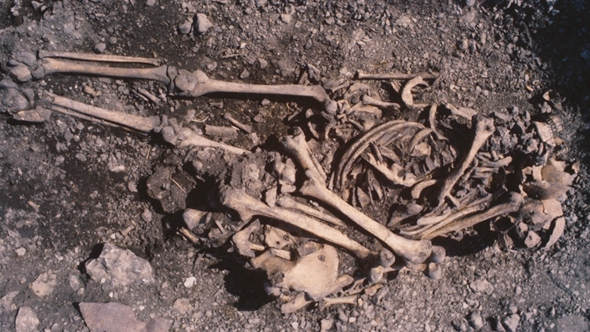'Biological aging' speeds up in times of great stress, but it can be reversed during recovery
Stressful medical experiences, such as undergoing major surgery or giving birth, can accelerate age-related changes in cells that then disappear during recovery.

Get the world’s most fascinating discoveries delivered straight to your inbox.
You are now subscribed
Your newsletter sign-up was successful
Want to add more newsletters?

Delivered Daily
Daily Newsletter
Sign up for the latest discoveries, groundbreaking research and fascinating breakthroughs that impact you and the wider world direct to your inbox.

Once a week
Life's Little Mysteries
Feed your curiosity with an exclusive mystery every week, solved with science and delivered direct to your inbox before it's seen anywhere else.

Once a week
How It Works
Sign up to our free science & technology newsletter for your weekly fix of fascinating articles, quick quizzes, amazing images, and more

Delivered daily
Space.com Newsletter
Breaking space news, the latest updates on rocket launches, skywatching events and more!

Once a month
Watch This Space
Sign up to our monthly entertainment newsletter to keep up with all our coverage of the latest sci-fi and space movies, tv shows, games and books.

Once a week
Night Sky This Week
Discover this week's must-see night sky events, moon phases, and stunning astrophotos. Sign up for our skywatching newsletter and explore the universe with us!
Join the club
Get full access to premium articles, exclusive features and a growing list of member rewards.
Our "biological age," which reflects signs of age-related decline in our cells and tissues, doesn't steadily increase along with our chronological age. Instead, new research suggests that biological aging can accelerate during stressful events and then reverse after those events.
In other words, there are measurable biological markers linked to age-related changes in cell function, and these markers can appear in times of stress and then disappear during recovery.
Scientists already knew that biological age's relationship to chronological age was somewhat flexible. But now, researchers say they have uncovered the possibility of biological age reversal.
Biological age is "much more dynamic than people previously thought," Jesse Poganik, a postdoctoral researcher and chemical biologist at Harvard Medical School who led the new research, told Live Science. "You can have these very severe stress events, which trigger an increase in the biological age, but it can be short-lived, if the stress is short-lived, and then the age can be restored."
Related: Scientists are hunting the secrets to extreme longevity in nuns... and jellyfish
In a study published Friday (April 21) in the journal Cell Metabolism, researchers examined the effects of short-term but extreme physiological stress on the biological ages of mice and humans.
They used what are known as DNA methylation clocks to quantify epigenetic (meaning "above" or "on top of" genetics) modifications in the structure of DNA that are tightly linked to aging. DNA methylation refers to a process where small molecules, called methyl groups, are added to the surface of a DNA molecule and help control how and when particular genes can be turned "on" or "off." Evidence suggests that patterns of DNA methylation shift across the life span and reflect biological aging.
Get the world’s most fascinating discoveries delivered straight to your inbox.
While these epigenetic changes are linked to aging, in this study, the team didn't directly test what impact these changes had on cellular functions.
The team first tested the flexibility of biological age in mice. They surgically joined pairs of young and older mice so that their bloodstreams merged for three months, which led to a significant increase in the biological age of the younger mice. After separating the mice for two months, the researchers found that the increase in age had been reversed.
Next, the researchers investigated shifts in the biological ages of people who were either undergoing major surgery, giving birth or receiving intensive care for severe COVID-19 infections. Blood samples from older emergency surgery patients showed a spike in biological age within 24 hours of their operations, but their ages dropped back down to their pre-surgery levels within one to two weeks.
The COVID-19 patients who survived the infection, however, did not bounce back so quickly. While women returned to their pre-COVID biological ages within two weeks, men did not seem to recover. This means that, from a biological age perspective, the time frame for recovery might depend on the type of stress and on sex.
In blood samples from pregnant people, the researchers detected a peak in biological age around the time the baby was born, which returned to its previous level within six weeks postpartum, on average.
While the study makes no conclusions about the effect of these biological U-turns on lifelong aging, failure to recover from stressful events may speed up aging, Poganik said. "Over the lifespan, you can accelerate the entire trajectory."
These fluctuations in biological age, which the researchers say are clearly visible in physiologically taxing situations, are unlikely to arise from everyday stress. "You probably wouldn't see it with mild day-to-day, having a bad day at work, kind of stress," Poganik said.
The results may point to an opportunity to test anti-aging drugs. "If you can identify a model where age is transiently elevated, you could potentially use recovery from that elevation to test the effects of different drugs," Poganik said.

Sascha is a U.K.-based staff writer at Live Science. She holds a bachelor’s degree in biology from the University of Southampton in England and a master’s degree in science communication from Imperial College London. Her work has appeared in The Guardian and the health website Zoe. Besides writing, she enjoys playing tennis, bread-making and browsing second-hand shops for hidden gems.
 Live Science Plus
Live Science Plus










